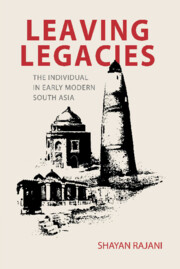Conclusion
Published online by Cambridge University Press: 28 November 2024
Summary
In Pakistan today, people look forward. Cars and motorbikes on the roads of Karachi and Hyderabad hurtle full speed ahead. Sideview mirrors are systematically removed from motorbikes, leaving no way to look back. Museums run empty. On most days, the National Museum in Karachi has more feline visitors than human. In schools, the past is taught by rote. It is transferred verbatim from textbooks into examination booklets. To score the highest marks, students must not change even a word of the text. The individual, the student, the reader, the present are set apart from history. Even if people present are confronted with the past, it is a vision they do not much like.
This book has shown that this has not always been the case. In the early modern, the past was not contained in chronicles alone. Nor was it rehearsed only in schools. It was immanent in buildings and books, and engaged with considerable enthusiasm. This past did not singularly signify collective histories of the political, religious, kinship, or corporate variety. Rather, it foregrounded individuals. Individuals crafted themselves in close engagement with the past. They remembered and responded to individuals past in the hope of a similar reception for themselves in the future. The past was not inert or over; it was responsive and pliable, yielding ever-new opportunities for individuals in changing times.
I have described this as leaving legacies. It denotes early modern people's concern for enduring beyond their own lives. People ensured self-extension not only through wealth and children but also by leaving material traces of themselves in monuments and books. These did not showcase individuality through a display of interiority or through a narrativization of the particular events and circumstances of a person's life history but rather by paying homage to other individuals or engaging in similar selfless actions. It is in this very gesture of selflessness that the named individual often appeared: humble, abased, and self-effacing. To take the acts of self-effacement in these legacies at face value is to continue to misread South Asia's past. By acting on behalf of another, praising another, helping another, legacies taught ethical lessons to their audience to do the same for the individual responsible as well.
- Type
- Chapter
- Information
- Leaving LegaciesThe Individual in Early Modern South Asia, pp. 194 - 202Publisher: Cambridge University PressPrint publication year: 2025

